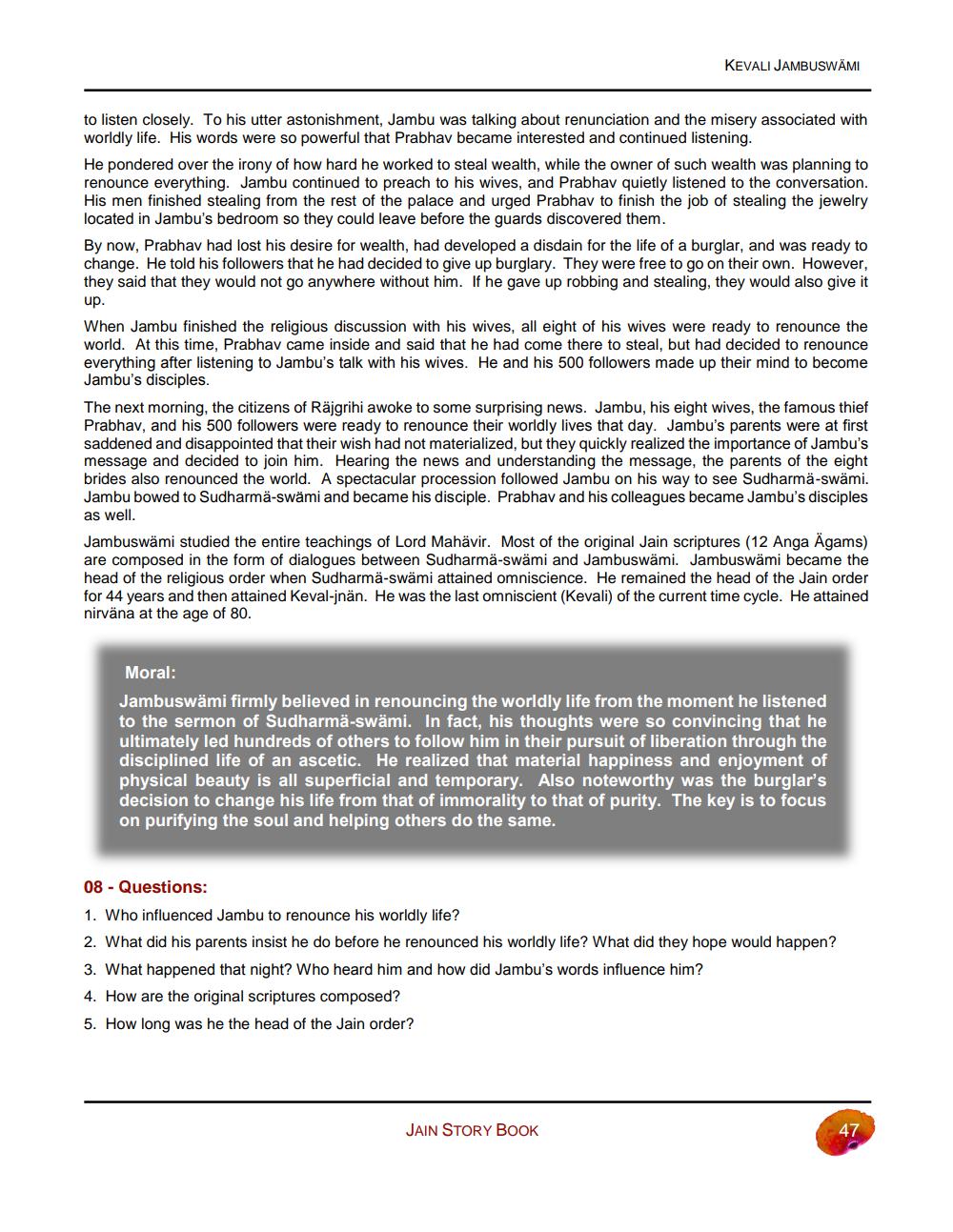________________
KEVALI JAMBUSWÄMI
to listen closely. To his utter astonishment, Jambu was talking about renunciation and the misery associated with worldly life. His words were so powerful that Prabhav became interested and continued listening.
He pondered over the irony of how hard he worked to steal wealth, while the owner of such wealth was planning to renounce everything. Jambu continued to preach to his wives, and Prabhav quietly listened to the conversation. His men finished stealing from the rest of the palace and urged Prabhav to finish the job of stealing the jewelry located in Jambu's bedroom so they could leave before the guards discovered them.
By now, Prabhav had lost his desire for wealth, had developed a disdain for the life of a burglar, and was ready to change. He told his followers that he had decided to give up burglary. They were free to go on their own. However, they said that they would not go anywhere without him. If he gave up robbing and stealing, they would also give it up.
When Jambu finished the religious discussion with his wives, all eight of his wives were ready to renounce the world. At this time, Prabhav came inside and said that he had come there to steal, but had decided to renounce everything after listening to Jambu's talk with his wives. He and his 500 followers made up their mind to become Jambu's disciples.
The next morning, the citizens of Räjgrihi awoke to some surprising news. Jambu, his eight wives, the famous thief Prabhav, and his 500 followers were ready to renounce their worldly lives that day. Jambu's parents were at first saddened and disappointed that their wish had not materialized, but they quickly realized the importance of Jambu's message and decided to join him. Hearing the news and understanding the message, the parents of the eight brides also renounced the world. A spectacular procession followed Jambu on his way to see Sudharmä-swämi. Jambu bowed to Sudharmä-swami and became his disciple. Prabhav and his colleagues became Jambu's disciples as well.
Jambuswämi studied the entire teachings of Lord Mahävir. Most of the original Jain scriptures (12 Anga Ägams) are composed in the form of dialogues between Sudharmä-swämi and Jambuswämi. Jambuswämi became the head of the religious order when Sudharmä-swämi attained omniscience. He remained the head of the Jain order for 44 years and then attained Keval-jnän. He was the last omniscient (Kevali) of the current time cycle. He attained nirväna at the age of 80.
Moral:
Jambuswämi firmly believed in renouncing the worldly life from the moment he listened to the sermon of Sudharmä-swämi. In fact, his thoughts were so convincing that he ultimately led hundreds of others to follow him in their pursuit of liberation through the disciplined life of an ascetic. He realized that material happiness and enjoyment of physical beauty is all superficial and temporary. Also noteworthy was the burglar's decision to change his life from that of immorality to that of purity. The key is to focus on purifying the soul and helping others do the same.
08 - Questions:
1. Who influenced Jambu to renounce his worldly life?
2. What did his parents insist he do before he renounced his worldly life? What did they hope would happen? 3. What happened that night? Who heard him and how did Jambu's words influence him?
4. How are the original scriptures composed?
5. How long was he the head of the Jain order?
JAIN STORY BOOK
47




